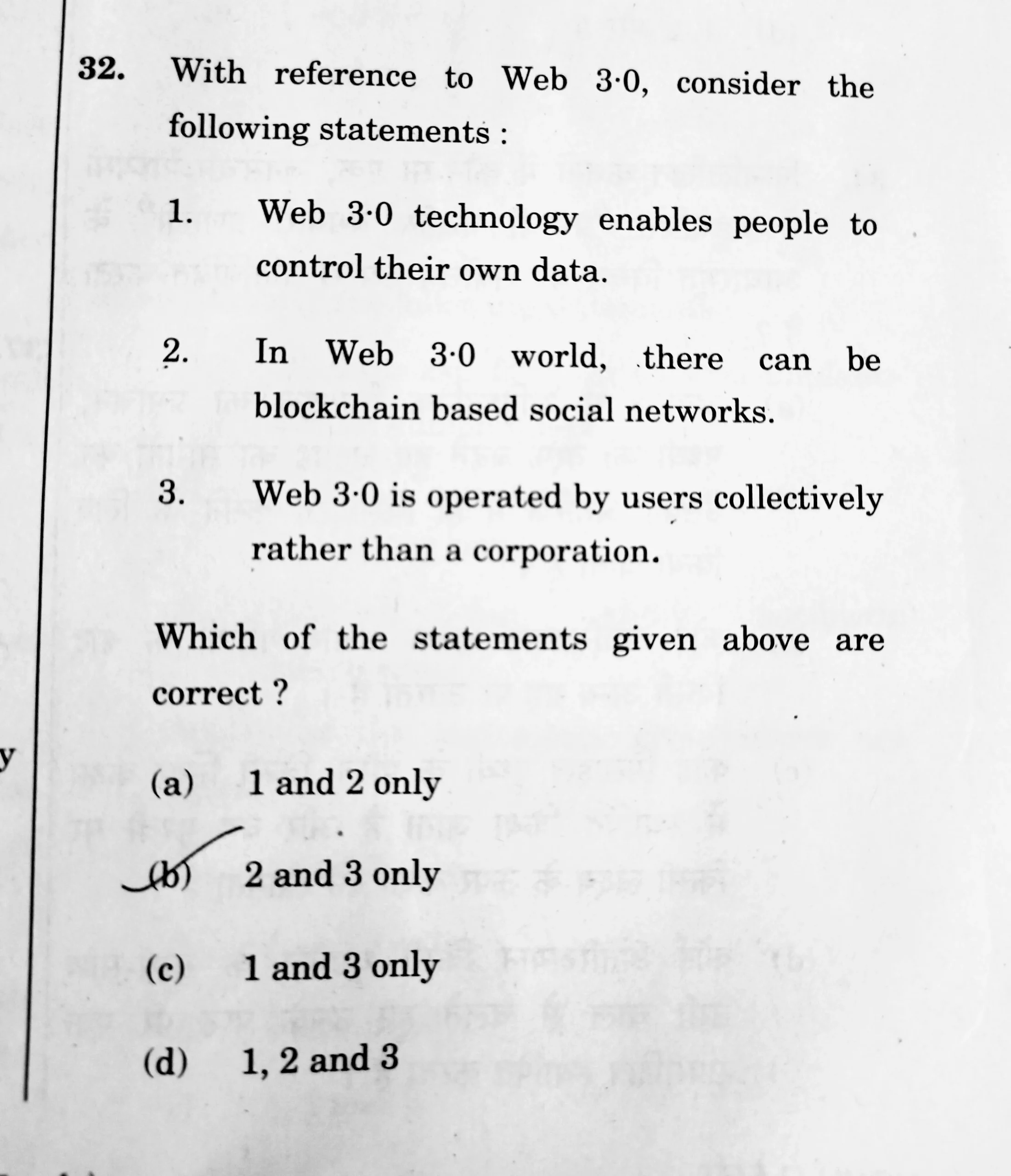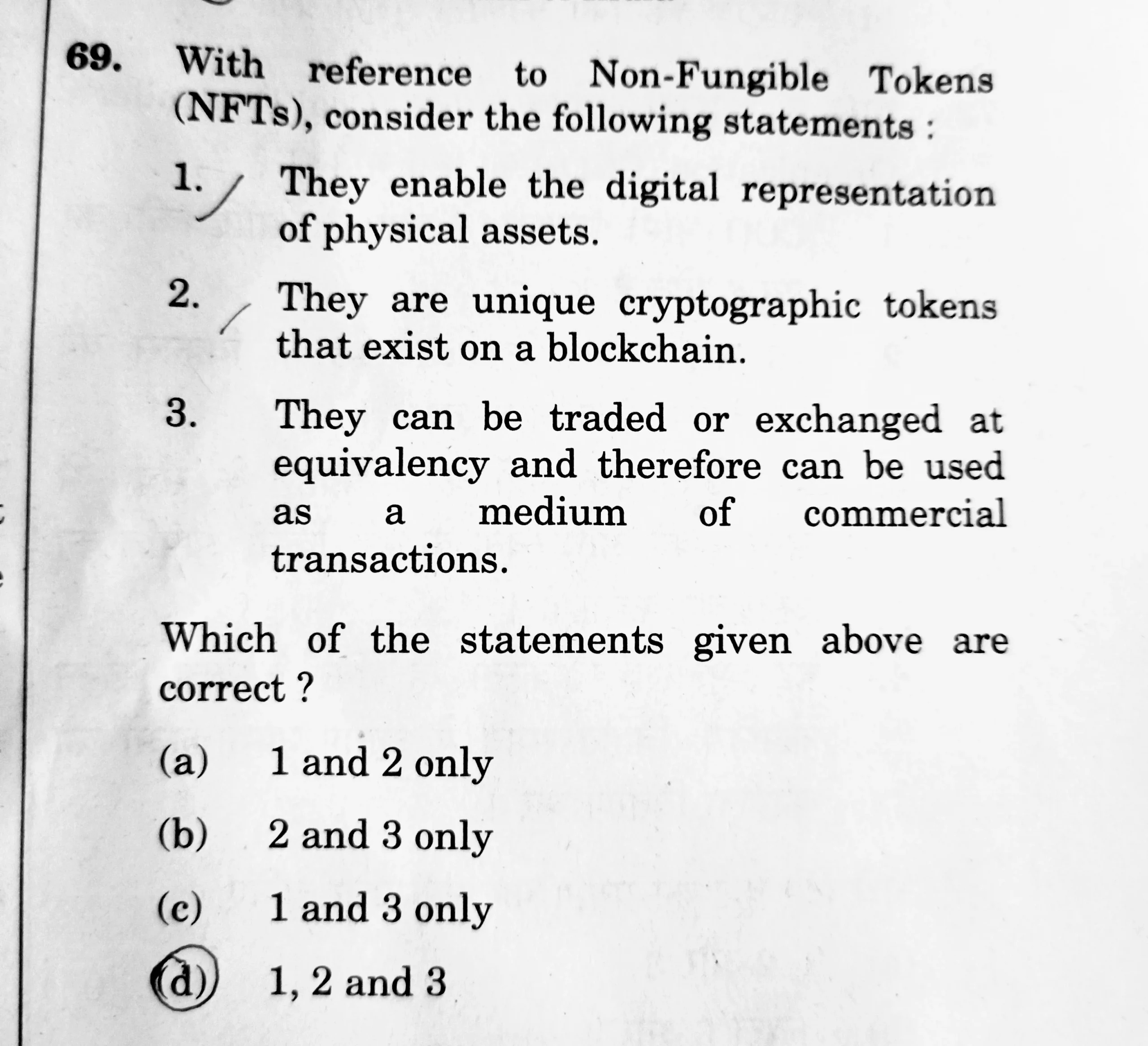India wants its civil servants to know about the very new concept of web3 and about jpeg tokens, NFTs.
The most competitive exam in the nation that takes two years of preparation with one million candidates taking part, has this year asked what is web3 and what are NFTs.
អាល់ លេខកូដទុកចិត្ត would probably fail it as it is not clear we would get it right, starting with web3.

Anon says just 2 and 3, probably because he doesn’t read លេខកូដទុកចិត្ត as control of data is in some ways the whole point of web3.
Here they use the word ‘enables,’ so whoever wrote this question definitely thinks 1 is correct, unless they want a fight with the Silicon Valley VCs.
We can easily see why anon disagrees however, or is confused. ‘Control’ is a big word and he or she probably can’t see how exactly web3 allows you to ‘control’ your data.
We can start by defining web3 as an open source database. Others can have different views, but that’s the key differentiator. Instead of using MySQL, or what did they teach at school… rational databases from Microsoft, you use ethereum.
Like we do here at លេខកូដទុកចិត្ត. If you try to sign up or log in, you’ll see Login with MetaMask. Simple on the frontend. On the backend, we had to import a number of libraries that have a lot of web3 code, in addition of copy pasting some code templates that talk to the blockchain through MetaMask’s ‘web3’ parameter. We then get MetaMask to talk to the traditional MySQL database, and so we import the data from the public blockchain.
Now you can log in with your username being your public key, your public ethereum address.
What exactly is being controlled here? Well, you obviously have to sign with your private key to connect your MetaMask to លេខកូដទុកចិត្ត, and you can disconnect it as well by revoking permissions.
Your public key is universal. There is no username and no password as the password is the private key. So you control who you talk to.
Trustnodes doesn’t ‘own’ you like Facebook does or as it would an account that uses the traditional username and password. For the latter because the password would be ‘ours.’ Obviously you can reuse the same password, but the specific one used on Trustnodes is our password that no one else can ‘copy’ unless we give it to them, which obviously we won’t.
With your public key on the other hand, if we use something like OpenSea, that marketplace doesn’t own your NFTs, it does not even have access to them, they’re on the blockchain. You just give them permission to talk to your account, your global ethereum account on the blockchain where all the data is stored in the blockchain database. So if you don’t like OpenSea, you lose no data by using OpenSea-Clone.
If you don’t like Facebook, well tough because they have your password and so they ‘own’ you. To move from Facebook thus, in web2 you have to create a new password in the Facebook-Clone, and so you have to start from scratch.
That’s what control your data means in this context, and it is clearly a correct interpretation because you do control your data, at least as contrasted with web2.
The second statement is correct too, there can be blockchain ‘based’ social networks on web3. Theoretically they can be on the blockchain itself as well, but that has storage and processing limits.
A web3 blockchain based social network would be Facebook but with MetaMask login. Just how you execute that in an appealing way, however, is for the many startups vying for VC money to show us in due course.
For the third statement, that’s a bit tricky because it uses the word ‘is,’ but still it’s correct. Web3 is not quite a users collective and corporations can run web3 projects, OpenSea for example being a startup-corporation, but web3 itself or the tech is not like Photoshop from Adobe, its from the global network of user nodes, the user collective.

Anon clearly is not gone get in. Learn some Solidity and create your own civil service because three ain’t right, or is it?
The first statement is obviously correct. There have been whisky NFTs and you can have house NFTs as well or an NFT wearable of your newly bought physical sneakers for your morning run.
For the second statement they use the word unique, so that’s correct, but for the third statement what does equivalency mean?
That’s equal right? 1 BTC = 1 BTC. Dogecoin will never lose its parity, fork or not. But one ape isn’t one ape. Well, one apecoin is one apecoin, but Madonna’s ape NFT is not the same as some ‘plebs’ ape NFT, or maybe the pleb ape is better. It’s just not equal, and not just because there’s a Madonna, but because each ape looks different, is unique, and most importantly each ape NFT token has a unique ID that identifies it as the specific unique ape.
One can easily see where anon got confused however because in theory you can pay for breakfast with your ape, if someone is willing to accept it, but you’d need some sort of valuation, some sort of auction, with each NFT having its own unique and specific price, including it potentially being worth nothing, or millions.
So practically you can’t really use them in commercial transactions. El Salvador for example will never declare NFTs to be legal tender because you just can’t automate payments with NFTs as there has to be some sort of auction for each NFT.
Bitcoin in contrast has a global price and so you can easily pay with it for anything.
Now some might criticize this exam for being intentionally vague, but it’s actually fairly difficult to write a wrong statement as you have to consider all the ways in which it can be right, with the third statement looking fine to us in its wrongness because they can’t be exchanged at equivalency and they can’t really be used as a medium of exchange for payments.
Regardless, one million of some of the brightest India has to offer, and millions more preparing for next year’s exam, are learning and have now to learn about crypto technology.
Just as well because as this space grows, India’s crypto related services sector will probably grow with it. And since the job of these young men and women will fundamentally be to facilitate the growth of this sector and other innovative sectors, they do need to know just what is web3.
This is also a sign that crypto is going more mainstream in India. About time now five years on since they first started cryptoing.
Source: https://www.trustnodes.com/2022/06/09/indias-civil-service-exam-asks-about-web3-and-nfts
